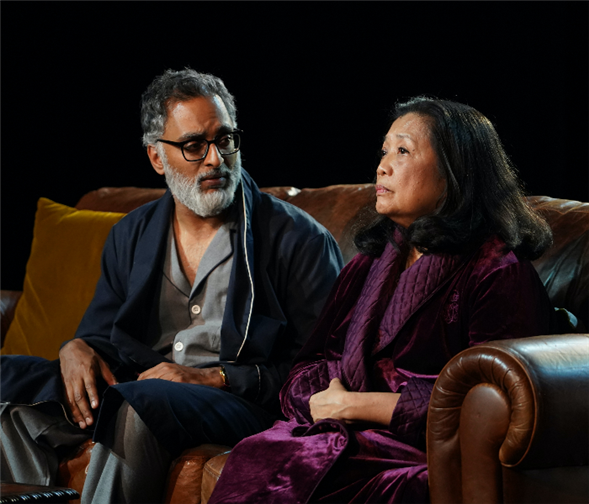You’ve Never Seen ‘A Delicate Balance’ Like This
Home > TDF Stages > You’ve Never Seen ‘A Delicate Balance’ Like This

The impact of featuring an all-Asian cast in Edward Albee’s classic play
—
“It’s exciting to play a character who is so smart and so articulate,” says Mia Katigbak about portraying matriarch Agnes in a groundbreaking new production of A Delicate Balance at the Connelly Theater. Coproduced by two acclaimed troupes, Transport Group and the National Asian American Theatre Company (NAATCO), which Katigbak cofounded in 1991, this is the first professional mounting of Edward Albee’s Pulitzer Prize-winning drama starring a completely nonwhite cast. Considering the late playwright’s estate’s prior nontraditional casting controversies, this is a thrilling sign of progress that dovetails with NAATCO’s mission to present “European and American classics as written with all Asian-American casts.”
A Delicate Balance centers around a well-to-do dysfunctional family: Agnes and her husband Tobias (Manu Narayan); their resentful daughter Julia (Tina Chilip), back home after another failed marriage; and Claire (Carmen M. Herlihy), Agnes’ alcoholic sister who’s a permanent houseguest. Their tenuous equilibrium is upended when Agnes and Tobias’ longtime friends Harry (Paul Juhn) and Edna (Rita Wolf) arrive in a tizzy and also take up residence.
Asian-American actors having the chance to play these typically white characters without comment is what NAATCO is all about. “Albee’s play is an American classic, and classics are synonymous with being interpretable universally,” says Katigbak, who’s helped spearhead all-Asian productions of Chekhov and Greek tragedies, Clifford Odets and William Shakespeare. “Who gets to interpret what is universal in this country needs to change. I think that just by doing these plays and not fidgeting with the script or accommodating our bodies or our cultures, we are saying something about what it means to be American.”
Jack Cummings III, the artistic director of Transport Group who’s helming A Delicate Balance, agrees. “If an actor comes on stage and says, ‘I am this person,’ I just believe it,” he says. He recalls directing Katigbak, who is Filipina American, in a revival of John Van Druten’s I Remember Mama at New Jersey’s Two River Theater. “She played a young Norwegian-American, first-generation daughter, and I always believed her.”
Katigbak’s costar Narayan, who is of South Asian descent, says he’s been fortunate to play some classic roles in his career, including Romeo and Charley Kringas in Merrily We Roll Along, and they’ve helped him grow as a performer. “One of the most important reasons why people of color should be able to do all the major roles is because, as artists, our ability can only get better, bigger and more powerful by being stretched,” he says. “I think the more we keep fighting the fight. as NAATCO has done for a long time, the more we open people’s minds. That’s the best part about being a person who is cast against what the majority would think of as type: Each time it’s done, the possibility opens up for it to happen again and again.”
While the casting may be nontraditional, this revival is scrupulously faithful to Albee’s text. During rehearsals, Cummings paused to ask an actor to check whether the script called for a period or a question mark at the end of a line. “I pay very close attention to the punctuation and exact wording, and also the things that Albee says in parentheses,” acknowledges Cummings. “The language requires quite an expanded version of one’s own vocabulary, the way Shakespeare does,” Narayan adds. “The play is symphonic. It’s like having your own instrument—all the characters have their own rhythms and ways of speaking. It’s great that we have a director, who also does musicals wonderfully, to help us find the depth that the language offers and also the humanity.”
Albee called A Delicate Balance a “social comedy” and described the characters as “teetering between being able to survive and being thrown into chaos.” More than 55 years after the play’s Broadway debut, it feels remarkably contemporary and uncannily prophetic, particularly the unspecified “fear” that prompts Harry and Edna to invade Agnes and Tobias’ home. Katigbak notes that when they first started talking about doing the play in 2020, violence against Asian Americans was increasing across the country. “You just put the play on Asian bodies, and you start thinking about it,” she says. The characters also use words such as “plague,” “disease” and “contagion,” which cause chills in our pandemic-gripped world.
Although Albee received the first of his three Pulitzer Prizes for A Delicate Balance, the play wasn’t hailed as a masterpiece until three decades later during its lauded 1996 Broadway revival. A quarter century on, this visionary production continues to burnish the drama’s reputation. “In musical theatre, it’s common now to say that Sondheim is the Shakespeare of Broadway,” says Narayan. “That’s really when you understand that the writing transcends the specificity of individual ethnicities to a broader humanity. If Edward were alive and able to see this production, I wonder if he would think of this as the bridge to his immortality.”
—
TDF MEMBERS: At press time, discount tickets were available for A Delicate Balance. Go here to browse all theatre, dance and music offers.
Gerard Raymond is an arts journalist based in New York City who’s a member of the Drama Desk and the American Theatre Critics Association.
Top image: Manu Narayan and Mia Katigbak in A Delicate Balance at the Connelly Theater Off Broadway. Photo by Carol Rosegg.

